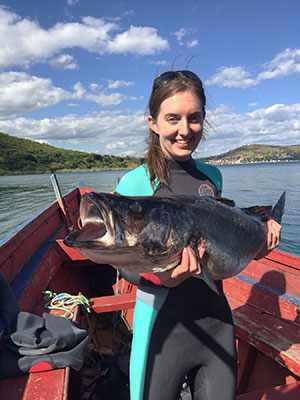
Katie Wagner, an associate professor in the University of Wyoming's Department of Botany, is part of a research team that received a $2.5 million National Science Foundation (NSF) grant designed to look at the effects of climate change on a large lake crucial to the ecosystem and the people living in Africa's Great Rift Valley.
The body of water -- known as Lake Tanganyika -- is one Wagner has studied her entire academic career, going back to when she was an undergraduate student at Whitman College in Walla Walla, Wash.
"Currently, Lake Tanganyika is warming, and this has major consequences for the stability of the ecosystem. Fish in the lake feed the millions of people who live on its shores, and disruption of the ecosystem from warming imperils these fish populations and, therefore, food stability in the region," Wagner says. "More specifically, the warming is thought to disrupt the cycle of nutrient upwelling that happens annually in the lake. And this has major consequences for the functioning of the ecosystem."
The five-year research grant is for a project titled "The Impact of Climate Change on Functional Biodiversity Across Spatiotemporal Scales at Lake Tanganyika, Africa." The project was selected through NSF's "Biodiversity on a Changing Planet" program. The grant begins next month and runs through October 2027.
The grant's focus will be to study how organisms in the lake have shifted in diversity and abundance over the past 15,000 years. This will be conducted through studying fossils in sediment cores taken from the lake; studying DNA preserved in those sediment cores; and through the use of genetic tools with current living species to assess how the size of their populations changes over time, says Wagner, a co-principal investigator on the grant.
"This last part is my focus, where we will study fish species that live in the pelagic zone of the lake," says Wagner, whose specialty is evolutionary biology. "I'll work to integrate this picture inferred with genomic tools into the picture that comes together with fossil data from the cores."
Michael McGlue, an associate professor in the Department of Earth and Environmental Sciences at the University of Kentucky, is the grant's principal investigator and will lead the research. Other grant researchers are from the University of Arizona, Brown University, the University of Connecticut, Indiana State University and the University of Toledo.
Only ranking behind Lake Baikal in Russia, Lake Tanganyika is the second-deepest and second-oldest lake in the world. For scale, Lake Tanganyika is the length of Wyoming from the northwestern corner to the southeastern corner, Wagner says. Located in eastern Africa, Lake Tanganyika is bordered by Burundi, the Democratic Republic of Congo, Tanzania and Zambia. The majority of its species are endemic, meaning the species are found only there.
"It has hundreds of endemic fish species and many endemic invertebrates also," including snails and ostracods, Wagner says. "The fish in the lake -- particularly those that live in the lake's pelagic zone -- are a crucial protein source for the millions of people who live around the lake."
Specifically, Wagner says the group will study two sardine species and four large predator species, which are relatives of Nile perch. The fish scales from the sardines are abundant enough in the cores that the team can track those populations both directly with fossils and genetic tools, Wagner says.
"Although the current warming is more than the lake has experienced in the past 15,000 years, there are two periods within that time where warming has previously occurred," Wagner says. "Studying the effects of these past warming episodes on the lake's diversity and functioning is, thus, a valuable analog to understanding what effects the current warming may have on the lake's biodiversity."
The results of the project will reveal how aquatic organisms, particularly economically important fish, respond to changes in temperature and precipitation within large tropical lakes, according to the project summary. With this data, fisheries and ecosystem managers will be better equipped to protect food resources and biodiversity, the summary says.






